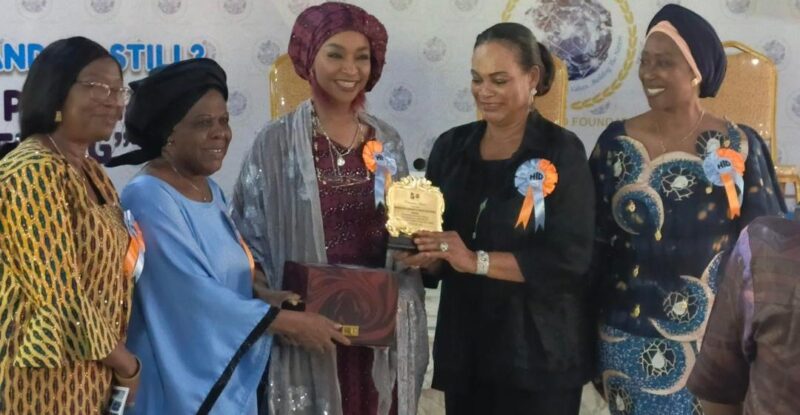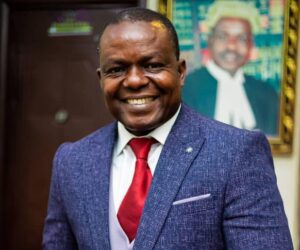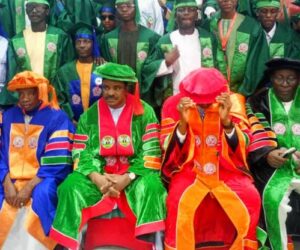2
LAGOS – Thirty years after the landmark Beijing Declaration, stakeholders have urged strategic reforms and deliberate policy actions to strengthen women’s participation in Nigerian politics, stressing that symbolic inclusion is no longer enough and that real progress requires intentional empowerment and systemic change.
The call came during the HID Awolowo Foundation Dialogue, convened to commemorate the one hundred and tenth posthumous birthday of Yeye Oodua, Chief Mrs Hannah Idowu Dideolu Awolowo, a renowned businesswoman, politician, community leader, and matriarch of the Awolowo dynasty.
The dialogue, themed “Breaking Barriers or Standing Still? Nigerian Women in Politics 30 Years After Beijing”, was held at Efunyela Hall, Ikenne, Ogun State, and attracted a host of distinguished guests.
Senator Daisy Danjuma chaired the event, while Her Excellency, Engr Nohimot Salako-Oyedele, Deputy Governor of Ogun State, attended as Guest of Honor alongside other politicians, academics, and activists.
Prof. Olabisi Aina, a renowned scholar on gender and political inclusion, opened the panel by emphasizing the critical role of intellectual rigor and feminist institutionalization in advancing women’s participation. She argued that women cannot merely seek representation but must ensure institutional frameworks are aligned with gender equality, stressing the need for policies that account for intersectionality, the diverse experiences of women across age, socio-economic background, marital status, and disability.
Prof. Aina highlighted successful models in Africa, such as Rwanda, Senegal, South Africa, and Kenya, where constitutional or party-led mechanisms have significantly advanced women’s inclusion.
She called for Nigeria to move from pledges to enforceable policies, warning that without strategic intervention, progress will remain symbolic.
In her opening remarks, Senator Danjuma reflected on the three decades since the Beijing Declaration, celebrating women like HID whose leadership showed that influence and courage matter more than titles.
Highlighting persistent obstacles from party gatekeeping to social norms, she called the gathering a platform for action, urging participants to move beyond rhetoric and build systems where women can lead boldly and shape governance.
Danjuma noted that progress requires courage, collaboration, and deliberate effort. “Nigerian women have the vision and capacity; what’s needed now are environments that recognize their leadership as essential to national development.”
Senator Lady Uche Ekwunife (Iyom), representing Anambra Central Senatorial District, detailed the persistent democratic deficiencies that limit women’s representation. She lamented that despite women being the majority in Nigeria, fewer than five currently serve as deputy governors nationwide, with Anambra State being the only state to have produced a female governor.
Senator Ekwunife (Iyom) recounted her personal experiences contesting for the post of Deputy Governor, highlighting opposition not only from male counterparts but occasionally from fellow women, emphasizing the need for solidarity among women leaders.
She also stressed that political parties must take the lead in creating structures that support women candidates and expand their participation.
Representing Osun State Governor, Ademola Adeleke, Hon. Soji Ajeigbe, Commissioner for Government House Affairs & Protocol, reinforced the call for structural reforms and institutional support, urging political parties to adopt internal measures that ensure women’s active participation at all levels.
He commended efforts that promote gender-friendly policies, such as directives requiring a minimum of forty percent women delegates in party elections, noting that such initiatives help women gain the confidence to contest and influence political outcomes.
Addressing the audience next, Barrister Hannatu Musa Musawa, Minister of Art, Culture, and the Creative Economy, provided a historical perspective on women’s activism in Nigeria. She cited examples from the Aba Women’s Riots of 1929, the leadership of HID Awolowo, Margaret Eklo, and Hajia Gambosa Waba, to contemporary figures like Ngozi Okonjo-Iweala and Aisha Yesufu.
Barrister Musawa underscored that while Nigerian women are powerful, unity and strategic organization are essential to transforming politics, stressing the importance of mentoring, coalition-building, and storytelling to normalize women in leadership. She shared her experience in the Federal Executive Council, where only seven women currently serve out of forty-nine members, highlighting how coordinated action has enabled women to act as a united barrier within government.
Earlier in her welcome address, Ambassador Dr Ọlatokunbọ Awolọwọ Dosumu, Convener and Executive Director of the HID Awolowo Foundation, reflected on the progress and persistent challenges facing Nigerian women in politics, thirty years after the historic Beijing Conference.
She traced the legacy of Chief Mrs HID Awolowo and Chief Obafemi Awolowo to highlight women’s courage and resilience, while acknowledging systemic and cultural barriers that continue to hinder meaningful inclusion.
Ambassador Dosumu urged emerging women leaders to act boldly, prepare diligently, and reject self-doubt, emphasizing that transformative change requires both individual brilliance and collective action.
She encouraged women to move beyond symbolic gestures and rhetoric, advocating for unity with purpose, mentorship, and intergenerational collaboration.
“Africa does not need women waiting to be invited to the table. Africa needs women who build the table and make space at it for others,” she said, calling for strategic, sustained action to break barriers and ensure women lead with confidence.
The dialogue further addressed gender-based violence in politics, including threats, intimidation, smear campaigns, and physical attacks, noting that in some regions up to 45 percent of women politicians have reported experiencing threats.
Stakeholders called on government, political parties, and civil society to implement binding gender quotas, mentorship programs, and financial support mechanisms to ensure women can contest, win, and govern effectively.
Other speakers, including Dr. Toyosi Akerele-Ogunsiji, stressed the importance of technology, education, and innovation in amplifying women’s political voice.
She urged young women to leverage these tools to overcome systemic barriers, while emphasizing mentorship, cross-sector alliances, and grassroots mobilization as key strategies for advancing women’s leadership.
The stakeholders collectively reaffirmed their commitment to breaking barriers, challenging systemic exclusion, and ensuring that Nigerian women fully contribute to the nation’s democratic and socio-economic development.
They emphasized that policy reforms, party-level interventions, mentorship, and cultural change are crucial for translating women’s participation from symbolic presence to real influence.






